Pat Bertram's Blog, page 17
August 5, 2022
Big Sibling
Detectives and other operatives in current mysteries and thrillers look to the internet and the sites where people hang out for clues, so much so that when an author fails to mention those social sites, the absence is glaring. Just as when they don’t mention cell phones. Because cell phones make our lives so much easier and make it harder to be out of touch, the cliché is that the character forgot to charge the phone or is out of range or some such excuse to put the character further into jeopardy.
Which reminds me of Judge Judy and how when defendants talk about a text conversation, and Judy wants to see the message, the defendants always say that it was on a different phone that got broken, and now they have a new one. It happens so often that it’s rather a running joke. But as amusing (or not) as that may be, this post isn’t about cell phones but the social sites.
Have you ever noticed I cannot bring myself to call it “social media”? The closest I come is “social networking sites,” which is what they were known as when I first got online. The “media” part, I suppose, is to make us think these sites have some sort of credence, which they don’t. Not only is the news (on any side of any matter) suspect, so are the lives people portray. As if they are better — or badder — than they are in real life.
In fiction, the lives portrayed online are counted as evidence, especially if someone tells a detective they hadn’t seen the victim in several months, and an online photo shows them together. Or if they say they have never been to a certain place, and a post says otherwise.
Since this happens in real life too, I have never been so naïve as to think that anything I post online is private. I have assumed from the first day that “Big Sibling” is watching me. (Trying to be gender neutral here.) To that end, I have never posted anything I wanted to keep private. In fact, I want people to see my posts and to get to know me in the hope that they will buy my books. Still, I do wonder what I am inadvertently giving away. Anyone can do a bit of detective work and find out where I live, but any official would already know that. Anyone can put the clues together and come up with my age. A few people know when I was born, but generally online I use a pseudonymous birthday. And anyway, that information is available in any official data bank, and especially is available to anyone who has access to my driver’s license, so it’s not much of a secret.
Those officials could comb Facebook for my friends, but then, they would probably already know who they were. And Twitter and LinkedIn? I have no idea who most of my connections are, and I have no interaction with them. In fact, my profiles on both sites are more or less moribund, though the link to my daily blog is posted on both sites. Or at least it’s supposed to be. I haven’t checked recently to see if that is currently the case.
I don’t post photos directly to Facebook, though I suppose they are stored on their servers anyway because of the link to the link to my blog that I post on the site. But that’s okay. Lately all I’ve been posting are images of flowers, not me and whatever victim I might be accused of victimizing. (Though my life is so boring, I’m sure if any official were to check with my neighbors, all they would have to say about me is, “Yes, I know her. Yes, I saw her. I don’t remember what day, but it doesn’t matter. I see her out in her yard every day.)
I am so used to telling the details of my small life that if I did have a secret, I probably wouldn’t have one. I would have blabbed it here, and a blabbed secret is no longer a secret. Though come to think of it, it’s possible they would think that anyone so bland would have to be hiding something (something other than blandness, that is).
Too bad. It would be fun to have a secret. Or maybe not, if fiction is anything to go by. People with secrets are often victims. Since that brings us back to the beginning of this post about officials who come to social sites looking for clues as to who might have wanted to erase the secret by erasing the victim, I’ve apparently come to the end of what I wanted to say.
I hope you have a very nice (and very private) day.

***

What if God decided S/He didn’t like how the world turned out, and turned it over to a development company from the planet Xerxes for re-creation? Would you survive? Could you survive?
A fun book for not-so-fun times.
Click here to buy Bob, The Right Hand of God.
August 4, 2022
Second-Class Mind
In a book I just finished reading, a teacher accused a grown character of doing a job anyone could do. As he said, “You have a first-class mind. Or if you want to quibble, a good second-class one.” That tickled me for some reason, perhaps because that would be how I’d like myself described, as having a good second-class mind. For sure, no one ever accused me of being a genius, of having a first-class mind. In fact, one teacher in high school said to me, “I bet you think you have a high IQ, but you don’t. It’s average.” Why a teacher would tell a student that — no, let’s be specific. Why a teacher would tell me that, I don’t know. I do know that teachers always thought I was an overachiever, as if my good grades came from constant study. In fact, one teacher told my mother that I worked too hard and that I should take it easier. I’m sure that confused my mother since she never noticed me studying or doing homework, but then, teachers never saw me for anything other than a passable, passive child who didn’t cause trouble.
I’ve been decades away from the influence of teachers who underestimated me, and yet, perhaps they were right. Like the character in the book, I haven’t been doing much with my good second-class mind. In fact, if you must know (which is a silly way to preface a comment because no one “must” know anything about me), I’ve been spending this lazy summer afternoon dozing . . . cough, cough . . . I mean reading. Or should it be the other way around? I’ve been spending this lazy summer afternoon reading . . . cough, cough . . . I mean dozing.
Either way, it’s not the day that’s lazy, but me. In my defense, I was anything but lazy this morning — watering, weeding, chatting across my fence with neighbors.
At least this afternoon was more productive than yesterday afternoon. I have a OneDrive account that I set up when I got a new computer so I could easily transfer my files, and now that my free space is filling up, they want me to start paying for the service. Instead, I spent an hour or so deleting redundant files and folders, and I accidentally deleted an important folder — my blog photos. Come to think of it, it’s not that important since all the photos have been uploaded to my blog, but still, I didn’t want to delete it. I had marked the folder as one to save on my computer no matter what, but apparently, when I deleted it from OneDrive, it still deleted it from my computer. And since the folder in its entirety wasn’t in my recycle bin (each file was listed separately), I had to restore the entire recycle bin. It took my computer hours to get everything back where I had it.
Not that what I did had any importance, it’s that the net result of my falling asleep this afternoon while reading had the very same results as yesterday’s attempt to clean up computer files.
So what does all this have to do with having a good second-class mind? Nothing really except it goes to show that whatever class mind I have (even, perhaps, no class at all), I’m not using it.

***

What if God decided S/He didn’t like how the world turned out, and turned it over to a development company from the planet Xerxes for re-creation? Would you survive? Could you survive?
A fun book for not-so-fun times.
Click here to buy Bob, The Right Hand of God.
August 3, 2022
Procrastination
I’ve been procrastinating, not having anything in particular to write about. I don’t want to bore people with talk of my yard and garden, and I certainly do not want to continue crying about the brown sections of my lawn that are not improving but instead are getting worse. It’s not as if it’s a major catastrophe, not when people in devastated areas are losing not only their lawns, but their homes and even their lives. Still, I do find it depressing, seeing all that brown when just a couple of months ago those same spots were such a vibrant green. And, of course, the death of anything is hard for me to take. (I’m one of those who truly will not kill a fly.) The unsightly patches wouldn’t be so hard to take, I think, if I could immediately address what worries me, as I always like to do, but it will be a month or even more before I can start reseeding.
So when a friend stopped by to see if I wanted to go on a trip with her, I was glad of an excuse to continue procrastinating. Unfortunately, I had to turn down her invitation since she was leaving tonight and I wasn’t at all prepared to be gone for several days, but it was nice chatting with her.
Then I roamed around the internet for a while and stumbled upon an interesting interactive site: https://dinosaurpictures.org/ancient-earth#0. You can put in the name of your city, and it will show you what that bit of Earth looked like at various times over the past 750 million years. Now that certainly put my concerns into perspective!
And anyway, there is still much for me to enjoy in my yard. In fact, today when I was clearing out weeds, I saw what I thought was a rock, but when I picked it up, I discovered it was a cucumber. Most of the cucumbers on the vine are tiny, no more than an inch or two, so I have no idea how that one grew so fast.
And there are always a few flowers to cheer me up.
Well, what do you know — I just noticed that even with all the procrastination, I’ve managed to write enough to fill a blog post! Yay!
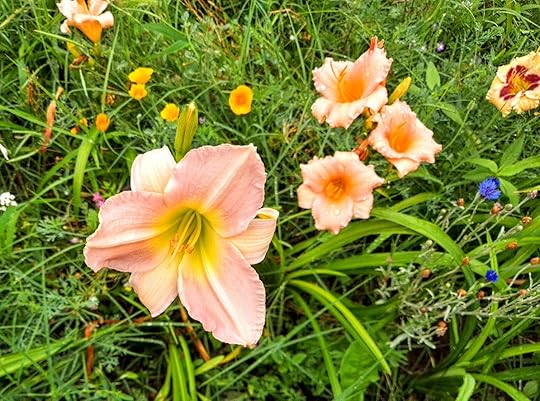
***

Pat Bertram is the author of Grief: The Inside Story – A Guide to Surviving the Loss of a Loved One. “Grief: The Inside Story is perfect and that is not hyperbole! It is exactly what folk who are grieving need to read.” –Leesa Healy, RN, GDAS GDAT, Emotional/Mental Health Therapist & Educator.
August 2, 2022
The Weed That’s Eating Colorado
So many of the weeds that are taking over this area were brought to this country on purpose. For example, the tamarisk was brought over from Europe to control erosion, and now it’s considered an unkillable monster that sucks up tremendous amounts of water that could be better used for native plants. Some people still think it was a good bargain because it will grow in salty and alkaline soils that other plants avoid, but then, the tamarisk helped create those dry salty basins in the first place. It’s no wonder it’s on the invasive plants list.
People are more familiar with the problem of kudzu, the plant that ate the south. Kudzu is native to Japan and Southeastern China, and was also brought over to control erosion. The vine grows as much as a foot a day! Yikes. I’d hate to have to deal with that sort of growth. I’m having a hard enough time with my own nemesis, kochia.
Around here the weed is known erroneously as ragweed, though the weed I spend so much time digging up is a completely different plant. It took me a while, but I finally tracked down the name, one I’d never heard of, though I’m not sure why. Kochia might not be eating Colorado, but it is so ubiquitous, it sure seems as if it is consuming the state!
Kochia, also known as fireweed because of its red foliage in the fall, was brought over here from Eurasia in the 1900s as an ornamental garden plant. I suppose it might be pretty as a red shrub, but I’ve never seen it turn red. It mostly dries out in the fall, turns into a tumbleweed, and spreads its seeds however far it roams. I’ve discovered it’s easiest to pull the kochia plants when they are small, though after it rains, even plants as tall as two feet can easily be pulled up. If they are left alone, they can grow as tall as seven feet. And by then, I’d need a machete to chop them down because there is no way I could ever pull up such a weed! Luckily, I’ve managed to stay on top of the growth, though just this morning I found a whole bunch of one- and two-foot weeds hidden away behind bushes and tomato plants.
It is a drought resistant-plant, so anyone around here who doesn’t take care of their yard ends up with a kochia forest. And when it rains, watch out! Those things grow fast, though luckily, not as fast as kudzu.
As much of a problem as kochia is in Colorado, you’d think people would be trying to eradicate it, but instead, some farmers in the Southwest grow it for forage. Makes sense, actually, since it is drought resistant and its feed value is just slightly less than alfalfa. But I don’t need the forage. Nor do I look forward to all the seeds from my neighbor’s kochia-infested yard finding a home on my property. At least I have a fence, so any tumbleweeds will have to find another resting place.
I don’t suppose it really matters what the name of this weed is — it is what it is, and a name doesn’t change anything — but with a name I can at least find out what I am dealing with.
And what I am dealing with is a rapidly spreading, drought-resistant invasive plant that really isn’t very pretty.
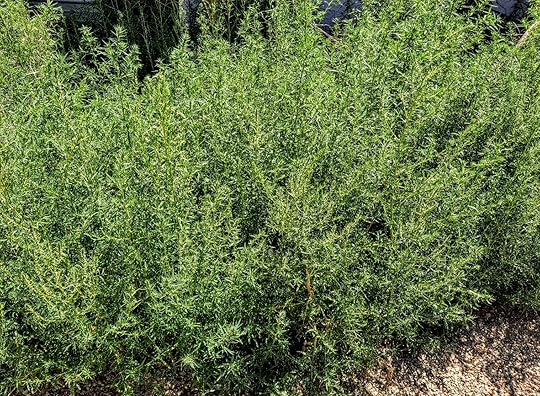
***
Pat Bertram is the author of intriguing fiction and insightful works of grief.
August 1, 2022
Just Flowers
If a picture is worth 1,000 words, then this post is worth 6,000 words. Wow! I didn’t realize I had that much to say today!
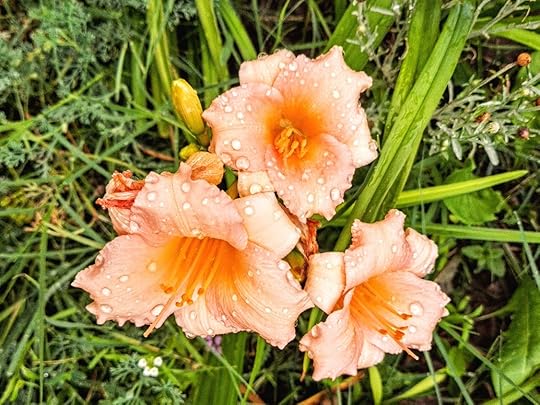
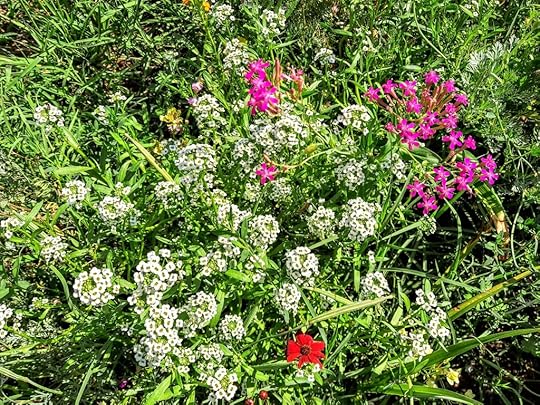

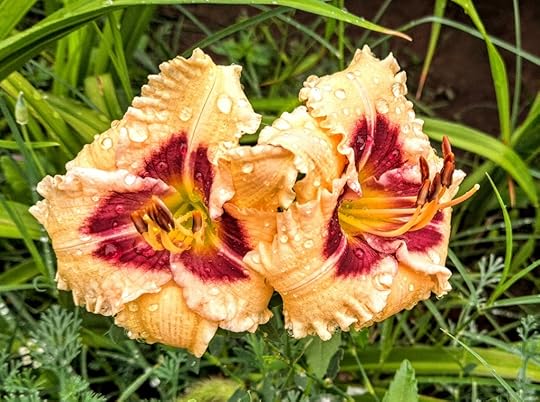
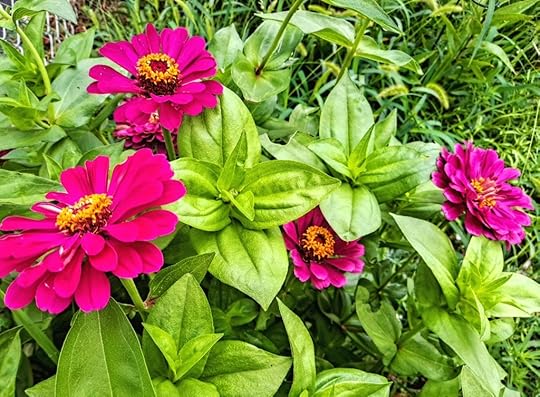

***

What if God decided S/He didn’t like how the world turned out, and turned it over to a development company from the planet Xerxes for re-creation? Would you survive? Could you survive?
A fun book for not-so-fun times.
Click here to buy Bob, The Right Hand of God.
July 31, 2022
Real Reality
I’ve been reading a book about cyber technology running amok, or perhaps people running amok using advanced cyber technology (so advanced, it hasn’t yet been created, though obviously it has been postulated by someone, even if only the author). To be honest, I’m not really sure what the story is about because unlike most books that I read at a single sitting or two or three (at most), the pages on this book aren’t advancing at all. I tend to think my slow progress has to do with my falling asleep while reading. (Well, no. I don’t “tend to think” that napping is the reason for the slow progress — I know it is.)
It’s no wonder the story isn’t keeping my interest. It’s hard for me to care about people —real or otherwise — who wrap themselves in the latest technology. I understand some body/computer interfaces could have (or for all I know, all ready do have) lifesaving capabilities, but I’ve passed my time of keeping up with current cyberlife. I use only a fraction of my computer’s potential, sticking with such basics as blogging, researching, shopping a bit, playing a game (though my interest in the hidden object game I was once fascinated with has been steadily waning). I certainly have no interest in the internet of things, a potential combined internet of things and persons, the metaverse, or virtual reality of any kind. I prefer to stick with real reality (or rather what passes for real reality since there is no real consensus on what reality is).
It is ironic, though, that despite my decreased use of social networking sites (I write my blog and spend about two minutes on Facebook going through the whole rigamarole FB has forced me into to post my blog on the site, but that’s it) I don’t feel as if I’m alone, though I actually do spend most of my time alone. It made more sense to feel as if I were with people back in the days where I was in fairly consistent contact with people, especially on the now-defunct writing site that was the best social networking site for authors, but now it’s more of a sense of being in contact rather than actually being in contact.
And then, of course, there are all those characters in the books I read that people my life.
I keep saying that one of these days I’ll start writing again, and I tend to think that day is coming soon. I was showing friends my zinnias yesterday, and it suddenly struck me that Zinnia would be a great name for a character. Later in the conversation, as we talked about lilies, it seemed that Lily and Billy would be great names for twins. Once an author has names, can a story be far behind?
I’m still “researching” the story. (By research, I mean I’m just living, but if I call my everyday life “research” then I can pretend I’m actually working as a writer.) Unfortunately, I still have no idea what story I want to write. It would be fun to write another “Pat” story, sort of a sequel to Madame ZeeZee’s Nightmare. One visitor told me I have a ghost, so I’m considering a ghost story. One friend has told me a few of her experiences that makes me wonder if I want to write some sort of alternate reality tale. For example, a wildfire burned all around her house, and the people who used to own the place (who were still emotionally invested in the house) watched four tanker trucks circling her property, spraying the house and trees to keep the fire away. The firefighters working that day said they only had one tanker truck, and they needed it to keep them safe from the fast-moving fire. Even worse, they saw embers landing on her roof, and later told her they felt bad they couldn’t save her house. They were astounded when she told them the house hadn’t been touched.
It’s certainly interesting to speculate which reality was real — the former owner’s, the firefighters, or my friend’s. They couldn’t all be real, could they?
Someday, I am sure, a story — either this one or another — will gather enough strength that will compel me to write, and when that time comes, I sure hope the book won’t put people to sleep.

***
Pat Bertram is the author of intriguing fiction and insightful works of grief.
July 30, 2022
Unplanned Joys
Today was a day of unplanned joys. You can’t plan such a day. Well, you can I suppose, but too many things have to come together, and some of those things — such as the weather — can’t be counted on. But today, the weather was perfect. Truly a joy.
Despite the lovely weather, I wanted a change from my typical morning of weeding. Not that the weeds were all gone — they’re not, and may never be gone, though come winter, they should go dormant along with almost everything else. But I needed to do something different, so I decided to clean my house. There was only a thin veneer of dust, but once that veneer was gone, it became apparent just how dingy the floors and furniture had become. But now, what a joy! Everything sparkles like new, or as new as a 94-year-old house can be.
Still charged with energy, I took a brief walk — also unplanned until the very minute I put on my walking shoes and headed out the door. When I came back, a friend came to visit. Admittedly, the visit had been planned. Because of her health issues, I hadn’t seen her for a long time, and we needed to catch up. We sat out in my gazebo, enjoying each other’s company, the lovely day, and the cool breeze. It was great seeing her, and even greater seeing how well she’s doing. (That part was one of the unplanned joys since I had no idea what to expect.)
After she left, I took a brief break for lunch, and then I got a text from another friend who wanted to know if this was a good time to visit. She and the woman she looked after had been wanting to come see my yard and try out my gazebo, but the weather has been a problem — too windy or too hot or too rainy. Well, today was none of those things, and so they finally were able to come.
I enjoyed showing off my yard and flowers, trying (but not succeeding) to disregard the areas of dead grass. I know I’ve said I won’t let those brown spots bother me, but it’s hard not to notice the dullness in comparison with the bright emerald green of the healthy areas. Luckily, my friends only looked at what was there, not what wasn’t.
Before they left, I showed them around my house. Which makes me wonder — did cleaning the house today somehow put all these unplanned joys into effect? Or was it merely a happy chance that today of all days, I felt like cleaning? Not that it matters — it just felt good to know the house looked its best.
And now, here I am, visiting with you. That, too, is a joy, though a planned one.
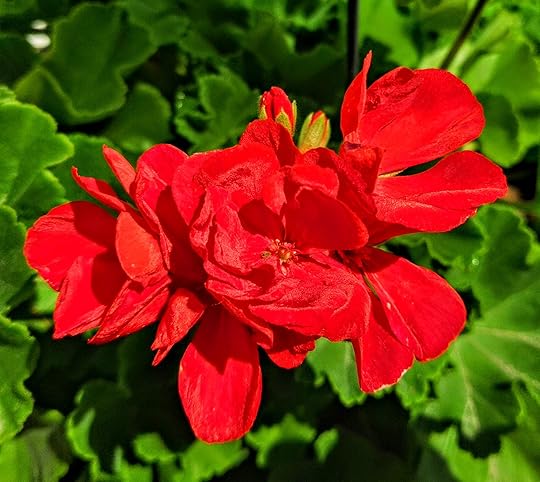
***
Pat Bertram is the author of intriguing fiction and insightful works of grief.
July 29, 2022
Imagine a Rainy Climate
I spent several hours this morning clearing out weeds and weedy grasses. I didn’t even make a dent — the growth (except for some things I want to grow) is overwhelming. I can’t imagine living in a climate where it rains all the time, though this past week where it’s rained so much (and yes, it did finally rain last night about 1:30 AM), I’ve had a glimmer of what it would be like. There would be a lot of good things about it — no time spent watering, no coaxing plants to grow in the arid climate, no dealing with plants dying because of a single day’s neglect. And it would be a lot cooler. Maybe. But keeping on top of weeds and such? Yikes.
My current plan is to do what I can, and when the annuals start dying off this fall, dig up the whole area where the weeds are now too deep seated for me pull easily, and replace them with a different sort of plant. I’m finding that I prefer clumps of flowers, like echinacea, New England asters, and four o’clocks, to single flowers because they are easier to weed. They also tend not to be as weedy, so that helps.
The wild four o’clock is blooming, mostly when I’m not around, but I did capture a couple of the flowers late yesterday afternoon. They are pretty, and when blooming in masses, must be awesome.
I hadn’t planned to write another gardening post so soon, and I certainly didn’t want to bore people with talk of the weather, but this morning’s exertions wore me out, and so there’s not much else in my head to blog about.
Maybe tomorrow, I’ll have some wisdom to impart.
Or not . . .
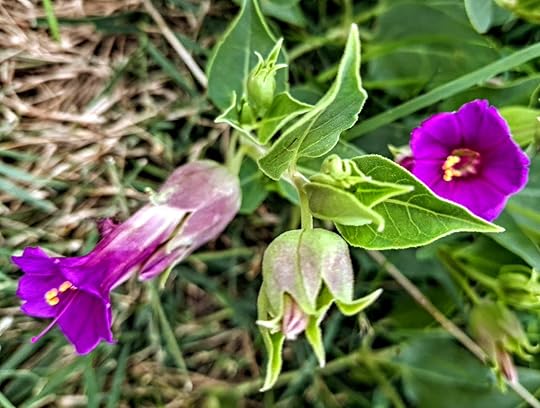
***

Pat Bertram is the author of Grief: The Inside Story – A Guide to Surviving the Loss of a Loved One. “Grief: The Inside Story is perfect and that is not hyperbole! It is exactly what folk who are grieving need to read.” –Leesa Healy, RN, GDAS GDAT, Emotional/Mental Health Therapist & Educator.
July 28, 2022
Playing the Rain Game
I’ve been playing a new game lately called, “Will it rain?” It’s a simple game, with no rules, no challenges, no rewards. All I do is track the possibility of storms with a weather app. You’d think it would be simple, a quick check to see what the day’s weather would be, and then the weather happens.

But not here, not now. Last night when I went to bed, there was a 75% chance of it raining in the early morning hours. It didn’t rain, so I checked the app when I got up, and it said there was a 95% chance of rain before noon. Again, it didn’t rain. So I checked the app again, and it said there was a 50% percent chance of rain by 3:00 o’clock. Not only did it not rain, but the sun came out and the temperature shot up about ten degrees more than was forecast. Now the app says 15% chance of rain after 7:00.
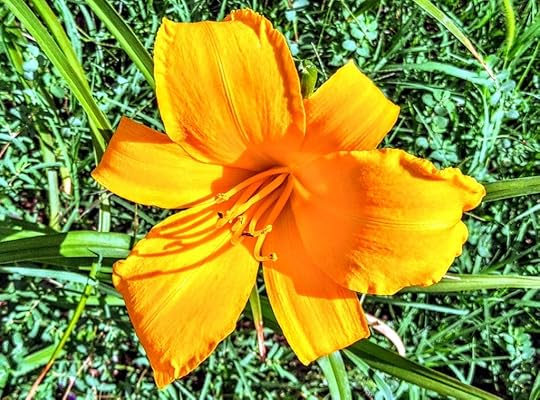
So, will it rain? Apparently, no one knows.

It wouldn’t matter what the forecast is, but with so many rain days that turned out to be non-rain days, I should probably water my lawn, but I certainly don’t want to oversaturate it. When we were getting rain, I got mushrooms in my lawn, and the brown spots where the grass died didn’t get any less brown.
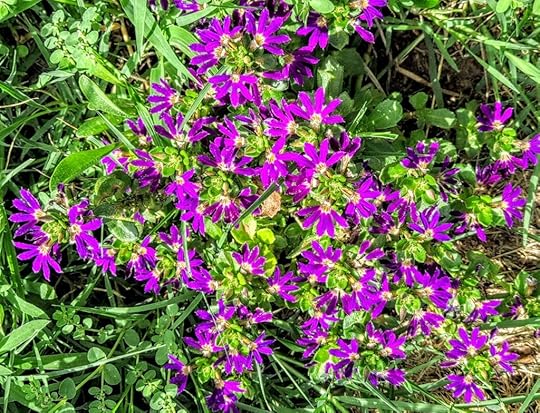
I’ve decided worrying about the lawn is a foolish occupation of my worry time. Not that I schedule a time to worry, you understand, it’s just that there always seems to be something niggling at me. In the fall, I will have to reseed a few areas where the grass has receded (it hasn’t just receded, it’s flat-out disappeared, but I liked the reseed/recede homophone). I will also have to dig up the Bermuda grass that is launching a full-scale attack on the finer grass, so it doesn’t really matter if I have five spots to reseed or ten spots. So, since it’s already in the schedule, it’s not worth worrying about.

I had been wondering about when to mow with all the rainy days we were supposed to have, but today, when the sun came out, I went out and did the chore. I also took photos of flowers, which I’m sure comes as no surprise to you. The dark purple petunia with the pink highlight is one of the petunias that grew itself from last year’s petunias, though those petunias had no pink highlights.
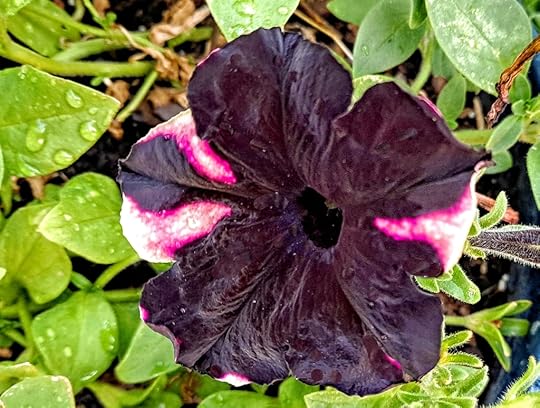
Tomorrow looks as if it will be a repeat of today, starting out with a 68% chance of rain, so lucky me — I get to play the game again.
***

What if God decided S/He didn’t like how the world turned out, and turned it over to a development company from the planet Xerxes for re-creation? Would you survive? Could you survive?
A fun book for not-so-fun times.
Click here to buy Bob, The Right Hand of God.
July 27, 2022
Apprenticeship

Sometimes I feel as if I am serving an alchemical apprenticeship as I continue my transformation into an old woman. You notice I said “old woman” rather than a “wise old woman,” because I’m not sure wisdom is something that can be apprenticed. Neither can old age, actually — we get there or we don’t — and yet there are things we can do to make aging easier.
My apprenticeship is about learning the art of living when it doesn’t seem as if life is worth living anymore. So many frail elders are beset by an existential crisis, especially when they are the last ones left of their family. (Or even if it only feels as if they are the last ones left.) It is a valid point — is life worth living when everyone you have loved has died? When you have little control over your life and yourself? When your body continually fails you? When it’s hard to see, hear, feel? When your days extent too far behind you and —even though you know you have an expiration date — seem to extend too far ahead? When all anyone cares about is how old you are, not about you and how you are dealing with your great age?
A vast old age (or even a frail younger old age) leaves elderly people feeling as if they have outlived their usefulness, as if there is nothing left to live for, as if they don’t belong here. I’m hoping, in this apprenticeship I have apparently taken on, that the lessons I learn now will become habit, so if (when?) I go through my own age-prompted existential crisis, the tools for continuing to live as full a life as possible will be at hand.
I have no idea what I will be feeling in those hopefully still-distant years. My experience with grief has taught me that we cannot imagine how we will feel about anything until we get there. I do look to the elderly people I know and have known in recent years, see how they are feeling and acting (or not acting), and try to extrapolate from them what I might need to know. One advantage I have is that existential crises are not uncommon for me, the big ones being when I hit adolescence, when allergies (and the prescribed allergy medication) tossed me into a black hole of depression, and when Jeff died. Too often, people sail along fine their entire life until they become physically incapacitated in some way, and then . . . wham! Along come all problems and thoughts that were held at bay by activity.
To this end, I celebrate the small beauties of the day — a flower, a pretty stone, a smile. I look for something to care about and to focus on — for now, it’s my yard, but when that becomes too much for me, I hope something else will come along to give my life focus. I look for something to be grateful about every day. Admittedly, it’s hard to think about one’s life here (especially if that life feels insignificant) when a person is focused on what comes next after this life. So along with the gratitude, I look for something to ground me, to connect me to life and to Earth. Right now, as with so much else, that grounding comes from my garden, from dealing with the literal ground rather than a mental one.
I am also paying attention to the ways my body works and doesn’t work to try to figure out what muscles I might need to exercise to make sure I can do for as long as possible the simple things we take for granted — stand, sit, walk, swallow. Yep, swallow. About a month ago, I was downing a vitamin when it slipped straight past my esophagus into my lungs. Yikes! Scared the heck out of me. So I researched the mechanisms of swallowing and learned that in order for the windpipe to be blocked off, it’s necessary to swallow with the tongue pressed onto the roof of the mouth. The only thing I can think of is that day I forgot how to swallow and relaxed my tongue and throat, and then . . . oops. I’m very lucky that it wasn’t worse. The pill (a capsule) was innocuous and eventually, it dissolved with no lasting effects. Now I am mindful of where my tongue is when I swallow anything. And if I don’t feel like taking the vitamins, I don’t. Even though I do feel as if they are helping me, they can’t help if I can’t swallow them.
It’s all part of the apprenticeship. There is no grade to this apprenticeship, nor is there any reward except that I get to live another day. When I feel more as if I “have to” live rather than I “get to” live, I remind myself that today is not given to everyone, and I find a way to mark the occasion. I hope I can continue to do so. If nothing else, having such a tool at my disposal will help make all the coming years worth living.
***

Pat Bertram is the author of Grief: The Inside Story – A Guide to Surviving the Loss of a Loved One. “Grief: The Inside Story is perfect and that is not hyperbole! It is exactly what folk who are grieving need to read.” –Leesa Healy, RN, GDAS GDAT, Emotional/Mental Health Therapist & Educator.



